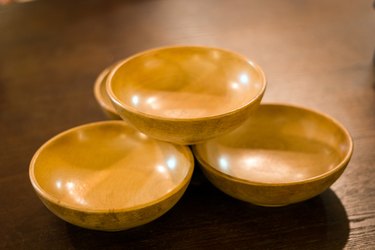
Bamboo bowls are pretty, practical additions to any home. Whether used purely for decor or as serving bowls or even salad bowls, they're a timeless classic. Bamboo is a fast-growing grass that's naturally mold- and mildew-resistant, and it's stronger than most hardwoods. Bamboo is also a smart, eco-friendly choice with low environmental impact. Properly cared for, quality bamboo bowls can last a lifetime.
Basic Cleaning
Video of the Day
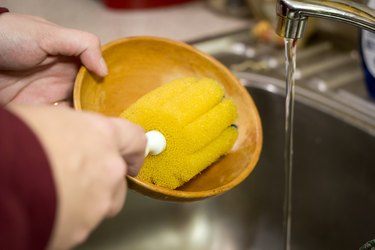
Bamboo bowls should be hand-washed immediately after use. They should not be placed in a dishwasher or soaked in water. The high heat of the dishwasher and the long exposure to water can cause the bamboo to swell and crack. To clean, first wipe out the bowl; then wash it in warm water with mild soap and a soft sponge or brush. Avoid abrasive cleaners or tools. Rinse thoroughly and wipe-dry with a soft cloth; then allow the bowl to air-dry completely.
Video of the Day
Regular Maintenance
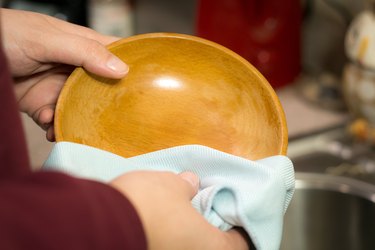
Like wood, bamboo bowls can dry out and eventually crack. To help prevent over-drying, periodically treat the bowls with a light coating of oil. A food-grade mineral oil, or mineral oil mixed with beeswax, are the most common options. If you want to avoid petroleum products, any shelf-stable, food-grade oil will work. It's best to avoid nut oils as they can easily go rancid. Use a soft cloth to apply a light coat of oil to the dry bowl, allow it to soak in for an hour or even overnight; then wipe off the excess.
Important Do's and Don'ts
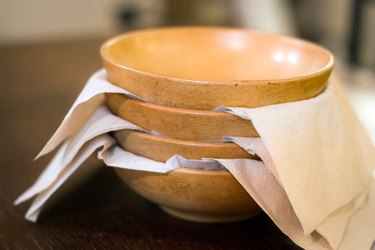
Even though bamboo is very sturdy, some things will damage the bowl and shorten its life. Don't use a bamboo bowl in the microwave; instead, heat food in a microwave-safe container and transfer it to the bamboo for serving. It's best to avoid really hot or really wet foods in bamboo bowls. They're better for salads than for soups. Don't store bowls nested, or in direct heat. Bamboo bowls should be stored in a dry place, where air can circulate around them. If bowls must be nested, place a paper towel between each bowl to help prevent any moisture buildup.
Other Concerns
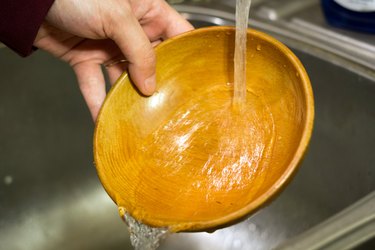
If a bowl becomes sticky, it's usually a buildup of excess vegetable oil. Use lemon juice and a gentle brush to scrub off the sticky residue; then rinse and dry the bowl and treat it with mineral oil. Lemon juice can also remove any lingering food odors that have seeped into the bowls and can help reduce stains. Keeping bowls well treated with oil is the best way to prevent stains, but natural bamboo bowls will darken over time. The variations in color add character to the bamboo's natural beauty.